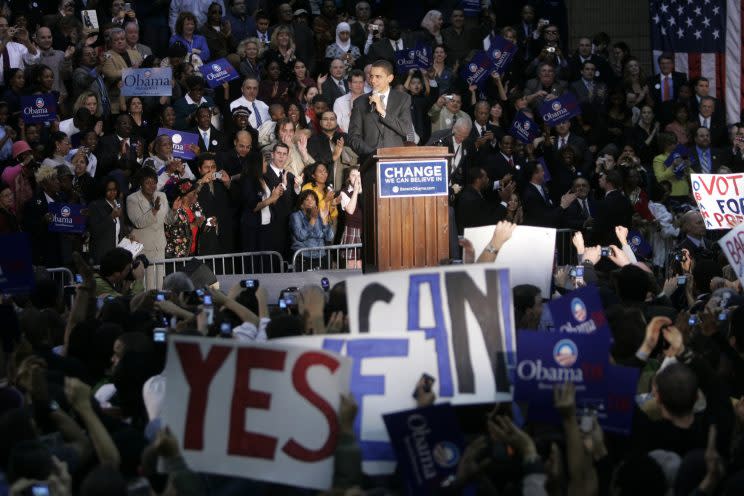‘It looked like the Pepsi logo’: Obama was initially skeptical of campaign symbol

President Barack Obama said he initially doubted whether the “Yes We Can” slogan or now iconic Obama logo would be successful when he was preparing for his 2008 presidential campaign.
In conversation with David Axelrod, chief strategist for both Obama presidential campaigns, the commander in chief explained that he thought the phrase “Yes We Can” was too simplistic and that the logo, reminiscent of the Pepsi brand, looked altogether too corporate.
Obama was contrasting his experiences at the Democratic National Conventions in 2000 and 2004 on Monday’s episode of Axelrod’s “The Axe Files” podcast. At the 2000 convention, few people even knew Obama’s name, and he had a difficult time getting in the hall. Just four years later, he was delivering the keynote speech that would propel him to political stardom.
According to Obama, this tremendous change was due partly to “the randomness of politics” and forces that were beyond his control. He said he hitched his wagon to a “broader spirit and a broader set of trends and a broader set of traditions.”
And he credited the team around him for key components of his whirlwind presidential campaign that he might have nixed if left completely up to him.

“When we came up with the phrase ‘Yes We Can,’ which again, to give you credit, I was a little skeptical of. It felt a little simplistic when we first started,” Obama said.
“You didn’t like the logo either, but that’s a different discussion,” Axelrod added.
“The logo I thought was a loser. It looked like the Pepsi logo, and I thought, ‘That seems a little corporate to me,’” Obama said.
“That’s what you said. It became more iconic than the Apple insignia. So I’m glad we straightened this out,” Axelrod chuckled. “I’ve gotten everything I wanted out of this podcast now.”
Graphic designer Sol Sender led the small team, which had never worked on a political campaign before, to create the logo in late 2006. In an interview for his current design agency, VSA Partners, he explained that Obama’s core appeal of “change” lent itself nicely to breaking from traditional designs, which typically only feature a last name and the election year.

“My firm had never worked on a political identity, and I think that gave us an advantage, because the design expression was so constrained and so bland for so many years in politics. I think that we had a fresh approach, because we had not ever worked on a campaign before,” he said.
According to Sender, he always preferred the design that would ultimately become the Obama logo, but that it was less clear for the client and some of his colleagues.
“We always from the start were very jazzed about this as a possibility. That it could stand alone as a symbol of support for the candidate,” he said.
The logo was debuted when Obama officially declared his candidacy for president in Springfield, Ill., in February 2007. It became one of the most recognizable in 21st-century politics, and was used again for Obama’s reelection campaign in 2012.
Obama debuted the phrase “Yes We Can” at the end of his 13-minute speech in January 2008, after losing the New Hampshire primary to then rival Hillary Clinton.

“For when we have faced down impossible odds, when we’ve been told we’re not ready or that we shouldn’t try or that we can’t, generations of Americans have responded with a simple creed that sums up the spirit of a people: Yes we can. Yes we can. Yes we can,” he said.
The audience in attendance started chanting those three words immediately. Then Obama outlined a somewhat mythical history of the United States, in which the phrase was a central creed to heroic figures: Founding Fathers writing the nation’s founding documents, slaves and abolitionists fighting for freedom, immigrants reaching American shores, pioneers pushing westward, workers organizing, suffragettes fighting for voting rights, President John F. Kennedy supporting the Apollo program to send astronauts to the moon and Martin Luther King Jr. advocating for civil rights.
Despite being a concession speech, it was among the most famous Obama ever delivered, and was transformed into a successful song and music video by will.i.am of the Black Eyed Peas.




